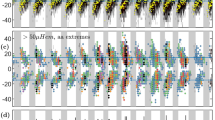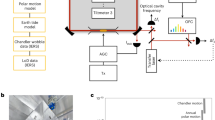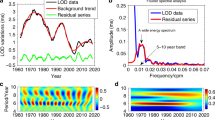Abstract
RECENT investigations at this laboratory have suggested a possible connexion between the variation in latitude of a given place on the earth's surface and the position of the moon in the sky at the time observations for latitude are made. An analysis of the whole series of the latitude observations which were made by Ross at Gaithersburg from 1911 to 1914, has revealed a striking correlation between the moon's hour angle and the value of the latitude obtained. The data were restricted to results obtained with the photographic zenith telescope, thus eliminating all personal equation. For convenience the observations were divided into two periods, one from 1911 to 1913, the other from 1913 to 1914. According to Ross's estimates, the 1913 to 1914 observations were considerably superior to those of the earlier years, as is evidenced by the smaller probable error.
This is a preview of subscription content, access via your institution
Access options
Subscribe to this journal
Receive 51 print issues and online access
$199.00 per year
only $3.90 per issue
Buy this article
- Purchase on Springer Link
- Instant access to full article PDF
Prices may be subject to local taxes which are calculated during checkout
Similar content being viewed by others
Author information
Authors and Affiliations
Rights and permissions
About this article
Cite this article
STETSON, H. Variation of Latitude with the Moon's Position. Nature 123, 127–128 (1929). https://doi.org/10.1038/123127c0
Issue Date:
DOI: https://doi.org/10.1038/123127c0
Comments
By submitting a comment you agree to abide by our Terms and Community Guidelines. If you find something abusive or that does not comply with our terms or guidelines please flag it as inappropriate.



